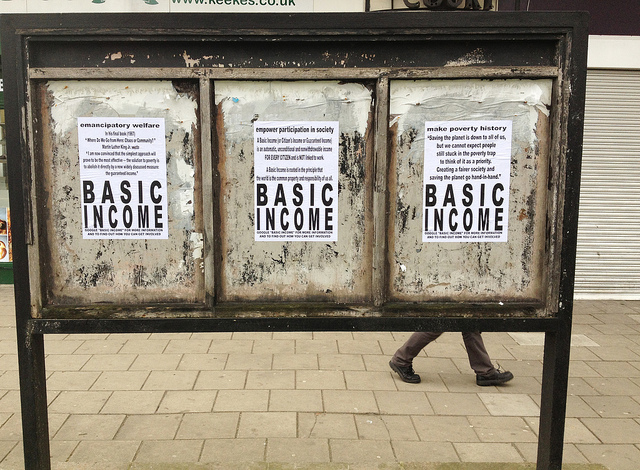Basic income is an idea almost as old as capitalism itself, appearing very early in the course of its historical development. The emergence of the idea of a basic income in the first few centuries of capitalism’s development in England became inextricably linked to economic crisis. Unsurprisingly, interest in basic income plans have resurfaced yet again in the post-2008 conjuncture. Current debates about basic income often invoke the framework of a morality play about personal responsibility, work ethic, and frugality that obfuscate organic features of the capitalist social formation, such as economic crisis. Therefore, this forum returns to the Marxist approach to answer the persistent questions that basic income provokes, and to help enlarge the Left debate on basic income that exists on the margins of public discourse.
Keyword: wages
We are All Housewives: Universal Basic Income as Wages for Housework
This paper proposes to orient contemporary debates over universal basic income (UBI) to broader social theory in the Marxist and Marxist-feminist traditions. Drawing on theories of labor decommodification, market socialism, and social reproduction, as well as more public-facing debates over policy, the purpose of this analysis is to better clarify the stakes a burgeoning left politics might have in pursuing the demand for UBI. Following key justifications put forward by chief proponents of the Wages for Housework movement for pursuing seemingly impractical, impossible, and politically ambiguous demands, I argue that UBI is best treated as a political perspective with both reactionary and revolutionary undercurrents. Urging caution, not dismissal, I refute more conventional economic analysis leading to common refrains against UBI, and suggest possible ways to bend UBI toward more explicitly socialist aims.
Review of The Social Life of Financial Derivatives: Markets, Risk, and Time by Edward LiPuma (Duke University Press)
Edward LiPuma outlines a sociohistorical theory of the market that positions derivatives trading as initiating a new form of capitalism. The book also confronts the narratives that the financial sector tells itself about the causes and aftermath of the financial crisis, revealing the social relations that underpin the entire enterprise. LiPuma exposes the wild-seeming speculation of hedge fund managers and traders as a rationale that disappears the social aspect of its own ritual induction and relational mode of production and reproduction. An understanding of the social underpinning of financial markets, LiPuma hopes, can lead to a politics of “just optionality” where the same methods for betting on securitized commodities (assets made liquid) like housing mortgages can be transferred into wagers that further the collective good. For Marxists, LiPuma has an urgent message: existing theories of the market are incomplete without an understanding of how financial capital, led by derivatives trading, has transformed the means by which capital reproduces itself.
Decommodified Labor: Conceptualizing Work After the Wage
A way to think labor after finanancialization, decommodifed labor refers to an emptying out of the same wage relation that nonetheless continues to structure our lives. “Working hard or hardly working” needs a new conjunction: in an age of decommodifed labor, one finds oneself working hard and hardly working. I suggest that decommodified labor offers cultural critics a form for isolating labor today that takes account of its relation to the wage, that may assist in periodizing the capital-labor relation, and that also highlights financial change alongside labor’s durational necessity under capitalism.
Response to “The Humanities and the University in Ruin”
In his response to Mowitt, Morgan Adamson sharply reminds us that working conditions and remuneration for work, not to mention layoffs, hiring freezes and slashing of benefits, certainly are pressing concerns. Offering a quick survey of some of the horrid details of the work expected of research assistants in science labs, Adamson also softens the distinction implied in Mowitt’s focus on the humanities as against the sciences.



